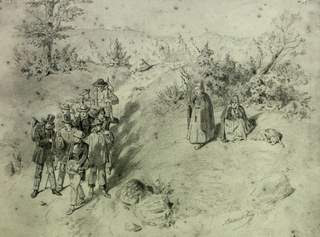When we first thought about moving house, we hadn't bargained on taking on another renovation. We did want to move into the town proper and we wanted somewhere that would serve as both home and office. The one that came to us and continued to attract us despite lots of looking elsewhere turned out to be in need of a huge amount of care and attention. In every other respect, it was perfect: a fascinating old building just outside the medieval town walls and with the very rare advantage of a good-sized garden. In the end, we just couldn't resist it.
 |
| Unloved and showing her age |
First priority was to get the office area functional, so that disruption to the business, Holt Immo, could be minimalised. As is usual with these ancient town house, the ground floor
had never been utilised as accomodation but was just cellar and
storage. It was dark, damp, and largely filled by the antiquated oil
heating boiler and tank and an obsolete septic tank.
The office to be. You can see the big fireplace on the right, and the dividing wall with the central passage on the very left. The barrel shaped thing in the middle is a concrete fosse septique (septic tank). The weird configuration of pipes feed toilet bathroom and kitchen waste direct to the mains waste disposal bypassing the old fosse septique. The first thing we had to do was knock the dividing wall down and then get rid of the antique fosse septique.
On
feeding the new waste pipes we discovered that the old
ceramic mains pipe running from back to front of the house was broken in several places. Poor hubby had the task of digging this up and replacing with new pvc pipe.
The next problem was the extreme damp in the floor, due to a small watercourse running underneath. Normally, we are firmly opposed to any attempt to damp-proof these old houses, as the result tends to be simply pushing the water somewhere else and normally good ventilation is sufficient to deal with most damp problems. In this case, however, we opted for laying a damp-proof course and a new concrete floor. To keep some ventilation, we edged the floor with the local clay tiles, known as tomettes.
The wall behind the waste pipes was totally rotten so had to come out as well. This gave hubby a chance to hide the pipes within a new stud wall, at the same time making space for a toilet under the stairs.
After that major reconfiguration, it was largely plain sailing: pointing, replacing the large window at the front, lining and plastering the walls and ceiling and finally the decorative touches like dado and paint. With great satisfaction, we finally put the desks in place and stood back to admire our work.
Now to attack our living accommodation! ...
.jpg)
.jpg)





